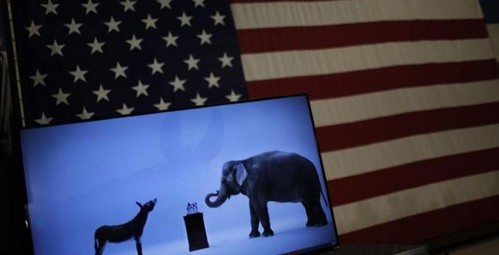Identity politics: the biological fraud
On its ever changing face, identity politics seemed pretty innocuous. It’s simply a way of unifying your demands among a similar group of people.
We’ve seen it take all shapes: There’s identity politics based on race, gender, disability and religion. There are loads of others — some so unusual they beggar belief (there are people who now identify as animals, for example. Sometimes, I feel that I am one of them).
But as identity politics expanded, infecting campus life, political agendas and self-absorbed acceptance speeches at award shows, we saw something strange and wonderful happen.
People had enough. And when I mean “people,” I mean people. Not select groups of people. But, you know, people — in general.
The kind who belong to all those social groups — gays, blacks, Hispanics, women, the transgendered — suddenly so many of us were coming to an eerie conclusion that something is inherently off about a political movement that seeks to divide rather than unite.
2017 may have been that year when identity politics hit a brick wall, and slumped limply on the pavement.
So, what turned us off to it? What tipped us off that a universe based on victimhood sucks?
Perhaps, after a constant barrage of hysteria and humorlessness, and the relentless invention of endless pronouns, we realized the movement was inhuman.
It felt wrong, because, biologically it is wrong. And it had to be stopped.
I’m in the middle of a great book by Matthew D. Lieberman, called “Social,” which traces the evolution of social cognition. As I’ve been reading it and underlining parts, I came to a theory that perhaps the author had not intended I might discover — but so what. I’ve realized that identity politics runs counter to evolution, and the way our brain is built. From Lieberman’s book, I’ve found that studies show that a brain at rest engages almost constantly in exercises involving social cognition. Meaning, we’re constantly thinking about other people, not just ourselves. It’s actually our default setting — the desire to connect — to bond.
The reason: It’s the building block for survival. If you can’t connect with others, then in all likelihood you will not live very long. People rely on other people to forage, to hunt, to build stuff. It’s an evolutionary adaptation — the better you are at connecting with others, the more likely you will survive.
I’m pretty sure that’s how jokes were born. If you could make someone laugh, that someone might not kill you. So, in theory, the more anti-social you are, the less likely you will survive. From that observation, I conclude that Identity politics is a purely anti-social movement. Because it’s just NOT FUNNY.
Seriously, it’s the least funny thing ever invented! Sure, it’s too damn easy to make light of its profound absurdities — but when you’re one of the many strident screamers immersed in this new religion, there is no room for laughter. You are the most seriously clueless creature on Earth.
And by being utterly humorless, identity politics is devoid of any potential for social connection.
How important is social connection in our lives? Lieberman points out that if Facebook were a religion, it would rank third behind Christianity and Islam. Essentially, Facebook is the religion of social connection. It’s wildly popular because we don’t just like communicating with others — we crave it.
Lieberman’s book points out that our brain is larger and more complex than that of other creatures not simply to help us solve complicated problems like proper hygiene and physics, but to enlist others to solve problems. Sociality takes up a lot of brain meat, for it is our primary mechanism for living.
Which is why identity politics — after decades of polluting our minds — now feels so wrong. We finally wised up. Identity politics preaches a splintering of one large collaborative group into competing vindictive ones — resulting in new angry tribes whose central thesis is to NOT cooperate. Because cooperation is a sign that you are violating their religion of separateness. In the American “melting pot,” identity politics wants to smash that pot — to bring us back to the Dark Ages, when collaboration was sparse.

Imagine if a village had to build a bridge to an island where fresh vegetables and fruits were plenty. Normally, everyone would pitch in and build that bridge, then share that bounty. But in the realm of identity politics, one might be ostracized for being co-opted into such corrupt endeavors. If this sounds absurd, you haven’t been keeping up.
There are groups who’d rather risk higher crime environments than make a safer haven for everyone. In the absurd idiocy of identity regressive politics, looting is seen as protest, and protecting one’s own property is seen as privilege. When activists chant “pigs in a blanket, fry them like bacon,” it’s a direct challenge to the community order that provides for community collaboration. Also, it’s gross.
Fact is, without sociality we’d be dead. We need to be social in order to create safe cities and communities — where we can then develop families, hobbies and educations. That’s the irony: without sociality, such destructive social justice warriors would not exist. They’re only able to rail against a community, if the community exists to create a calm, nonviolent environment for them to exploit. They wouldn’t get away with such protests in any of the countries currently on the travel ban (a ban so many had protested safely on Seattle and Manhattan streets).
Why is identity politics still so attractive to people, even when it runs counter to deeply held human desires? Because excluding other people makes one feel powerful. It’s emotional: identity politics is about insecure, attention-seeking people exerting payback on others. They base their actions on a sense of unfairness – when, in fact, their major goal is to exact unfair punishment on you.
The entire basis for “white privilege” is payback. It’s there purely for someone to say to someone else, “you are guilty, and you should feel bad.” And if you’re a guilt-ridden 19-year-old white freshman who simply wants to fit in, you will agree. Ironically, the biological need for connection forces you to agree with someone that you should be alienated from the group!
Cooperation is unique to the evolved human, which is why identity politics feels like regression — it feels backward. Lieberman’s book offers studies that show we feel better when we share things, and feel worse when we think we’ve been cheated. Pleasing others feels better than its opposite, so we wish to improve the well-being of others. Identity politics, however, wishes to replace that biological need with an artificial but adrenaline-producing vindictiveness. It’s an anger-drug.
It’s why you never see a happy social justice warrior. If studies on the brain show that cooperation makes you feel good (it’s pretty much an opiate), it would make sense that the opposite behavior would make you miserable. See the shrouded ANTIFA for evidence — the people shutting down speeches and events, who seem to be miles and miles from ever achieving a modicum of happiness.
So, if connection is the central activity that created civilization, and is necessary in preventing its downfall, why do we so casually ignore what undermines it?
Perhaps because our biological desire for connection also makes us vulnerable to its enemy: we are less likely to call out evil, for fear of being ostracized. We may not like evil, but calling it out might risk our own social standing (Example: if you speak out against radical Islam, you will be called Islamophobic — a bigoted conflation of extremism and non-extremism if there ever was one).
Any movement that strives to break the human connection through divisiveness works against our own humanity. So when you are faced with any such desire for separatism — on campus or elsewhere — realize it’s a road to ruin. And exit through the nearest door. Find someone you can connect with, over a beer, or a sandwich.
Civilization depends on it.





